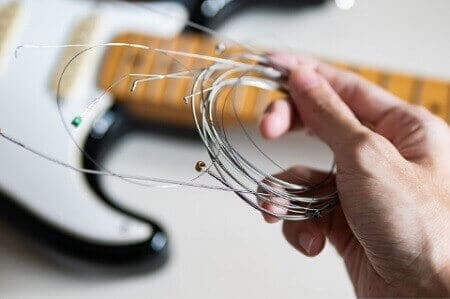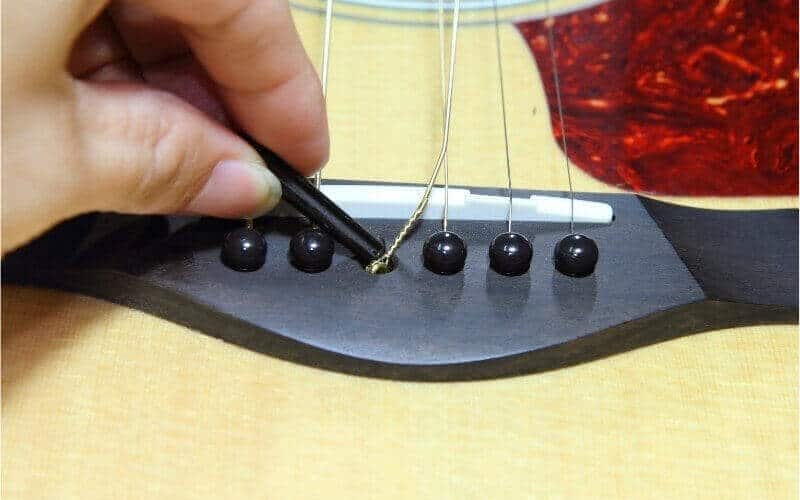A guitar string is a core component of the instrument. The vibrations it makes are what your pickups or the hollow body of an acoustic guitar resonates to make a sound. Without it, it’s unplayable.
But guitar strings do more than just that. They help build your tone and even influence your playing style. So one must be careful what guitar string or brand to use and know how to take care of it including how to regularly change it whenever it is necessary.
Let’s find out how often you should change guitar strings. Plus, we’ll throw a few more tips to help you improve your guitar playing.
Key Takeaways:
- Regularly changing guitar strings is essential to maintain tone quality, prevent sudden breakage, and ensure a smooth playing experience.
- Acoustic guitar strings should be changed every 3 months or after about 100 hours of practice to maintain crisp notes and tone integrity.
- Electric guitar strings, with lower tension, can be changed every 3 months or after 100 hours of usage to preserve a fresh tone, especially for lead guitarists.
- Bass guitar strings have a longer lifespan and can be replaced once a year for a fresh sound, with non-professionals possibly changing them every 6 months.
Reasons Why Guitar Strings Need Changing

We must first discuss why in the first place should you replace your guitar strings before anything else.
- Guitar strings no matter the quality and either acoustic, electric, or even bass guitar will break due to various reasons including but not limited to tension, wear, extreme strumming, or rust. Naturally, once this happens you won’t have a choice but to replace a broken string for your guitar won’t sound well even if it lacks only one string.
- Some guitarists, especially professionals, change their strings regularly. Fresh strings are less likely to break and help maintain their tone. This is particularly crucial for guitarists who frequently tour or have regular gigs, as they always want to be confident on stage without worrying about sudden string breakage. Additionally, some professional guitarists maintain their guitar tone by consistently using fresh strings. They don’t wait for a string to break before replacing it; instead, some artists change strings before every gig.
- There are guitar players though that do the exact opposite and don’t replace their strings until they break naturally. And that’s not because they can’t but because of some like the sound of strings that have stretched in due time. Some guitar players even prefer rust on the strings for a specific feel.
- These habits are not only true for performing artists but also for the ones stepping inside a recording studio. They would either change into a new set of strings before recording a new album to get the tone that they are after.
Knowing these reasons allows you to appreciate the value of good quality guitar strings as they aren’t just a means for your guitar to produce sound. They also affect your tone and overall guitar playing experience.
Before we start on our next three sections on changing guitar strings for acoustic, electric, and bass, let’s establish the reasons why it’s necessary. You need to change your strings as often as we’ve indicated to maintain their integrity, ensuring they won’t suddenly break.
Regular string changes also help maintain the tone of your instrument and prevent any potential harm from rust.
And we also would like to emphasize that strings break or wear out based on how much you use it. But also remember that sometimes, strings break because of rust when not in use for most of the time.
Optimal Frequency for Changing Acoustic Guitar Strings
For acoustic guitars, it’s prudent to change your strings every 3 months or about 100 hours of practice. This is especially true if you use your guitar often and when you perform with it. An acoustic guitar often has more tension and higher action compared to electric guitars. So that contributes to its lifespan too.
It’s always nice to have a fresh set of strings on your acoustic guitars for you probably incorporate a lot of plucking in your playing style and you want every note to ring out as crisp as possible. And that’s always possible with a well-maintained guitar with fresh strings now and then.
How Often Should You Change Electric Guitar Strings?

Electric guitars enjoy the luxury of having less tension compared to acoustic guitar strings. This results in lower action and preserves your strings for a longer service life.
However, it is also recommended that you change them every 3 months or after 100 hours of usage to maintain a fresh tone.
Again, this holds true for performers, especially lead guitarists, who bent strings constantly. Many people, including professionals, may not bother changing them if they don’t notice significant wear or tear, even after, let’s say, six months.
Refreshing Your Bass Guitar Strings: Best Practices
Naturally, bass guitar strings last a lot longer compared to acoustics and electrics. And, they seldom break on you. Standard bass guitar strings can be replaced once a year for you to get a fresh sound or tone from your instrument.
Changing it every 6 months would already be too often for non-professionals.
PRO TIP: Loosen the strings of your guitar when you are not using it, and ensure you store it inside its case in proper conditions. If possible, consider investing in a guitar rack or stand for even better storage. Avoid exposing it to anything that may cause rust.
Loosening the strings should be easy on the bridge, neck, and the strings themselves. Plus, it gives you the opportunity to practice tuning every time you start a practice or performance session.
Frequently Asked Questions:
How To Tell If My Guitar Strings Are Dead?
When you notice that your guitar strings are not staying in tune and notes are not ringing out as well as it used to do then chances are your guitar’s strings are already dead and it may be time to replace them.
Also, do a physical inspection of them. If you see their natural color has turned to dull grey or black by checking at untouched string areas around the tuning posts or in case of coated strings if coating slowly deteriorating then that should be a clear sign to replace them.
How Often Do Professional Guitarists Change Strings?
It would depend. As mentioned above, some prefer to change every gig with some maybe within a month. It all depends if they are on tour, recording, or if it’s downtime with no gigs.
What Happens If You Don’t Change Guitar Strings?
If you don’t change your guitar strings then you’ll suffer from sudden breakage and you don’t want that especially when you are on-stage performing. You’ll also hurt yourself as the wear would damage its coating. Also, you’ll suffer from poor guitar tone when guitar strings get old.
Can I Replace Just One Guitar String?
Of course, you may. But take note that there are factors to consider here like if you’re replacing it with the right gauge or the same brand or product. These factors may affect the overall tone of your guitar.
Final Words
If you play or practice guitar daily for several hours, you should change your guitar strings more frequently. On the other hand, if you are an irregular player who has kept his guitar in good condition, then your guitar strings will possibly last longer.
But keep in mind that even if you don’t play regularly, rusting and corrosion can affect guitar strings. To mitigate that and extend the natural oxidation process of string material, you can wipe down strings after every session using a string conditioner.
Overall it’s a good practice to change strings every 3-months or 100 hours of usage. You can also use coated strings that will last longer than non-coated. So if you’re serious about guitar playing, then this little extra cost of changing strings will be worth the investment.
About the Author
Thomas M., the founder of Guitar Top Review, boasts 15+ years of guitar experience and was a church band member in L.A. Transitioning from piano to acoustic guitar, his first love remains his Taylor GS Mini. Alongside like-minded hobbyist friends, he launched the site, driven by a deep love for music that transcends professional boundaries.



Since I’m an irregular player, I resonate with the sentiment of avoiding string changes until necessary. I’ve been strumming without a high E for over a month, showcasing my reluctance to swap strings. The hassle of changing them often leads me to adapt my playing style, but the time has come to refresh my sound.